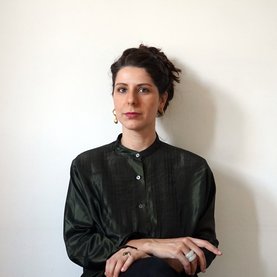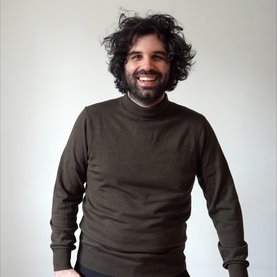ADS7: The Fifth C
Jump to
For ADS7, conviviality has always been simultaneously: the subject of study; the methodological approach; and the expected outcome. This year the studio will become a place to teach and learn about how to build places for teaching and learning. We are convinced that education, when nurtured within convivial settings, is the most important basis on which to establish new and conscious socio-political mechanisms.

'The Strawberry Statement' is a 1970 American comedy-drama film set during the counterculture of the 1960s and the student revolts of the era. The story was based on James Simon Kunen’s smart, quirky, humorous book (titled “The Strawberry Statement: Notes of a College Revolutionary”), which looks at the spring 1968 Columbia Strike through the eyes of an undergraduate, who never turned into a revolutionary. Kunen describes himself, at the beginning of the protests, as someone that will “do anything to feel like I'm doing something." He becomes deeply engaged and radicalised—expressing rage with the cops and revulsion with the university’s administrators.
Studio Tutors: Lemonot – Sabrina Morreale & Lorenzo Perri
Over the last two years, ADS7 has explored conviviality as a design tool to capture the often-subtle processes and differences between ordinary cohabitation and complex human interactions. In 2024/25 we will keep on employing conviviality as a gentle, playful form of resistance, while focussing on the mutual relationships between spatial and pedagogical frameworks. For ADS7, conviviality has always been simultaneously: the subject of study; the methodological approach; and the expected outcome. This year the studio will become a place to teach and learn about how to build places for teaching and learning. We are convinced that education, when nurtured within convivial settings, is the most important basis on which to establish new and conscious socio-political mechanisms.
In his book 21 Lessons for the 21st Century, Yuval Noah Harari makes the argument that education should be focussed on the ‘four C’s’ – Collaboration, Communication, Critical thinking, and Creativity. ADS7 advocates for the addition, even the necessity, of a fifth C – Conviviality – in order to turn learning environments into sites of actual belonging. Spaces in which we can engage with ethics, see others, read them in their social context, and truly relate to one another in spite of historical hierarchies of exclusion. ADS7 insists on conviviality as we believe ‘it is deeply phenomenological, for it understands sociality as being in the world, as transforming, proliferating, interacting and becoming’.
Inclusive Intrusions
Noor Abed and Lara Khaldi’s 'School of Intrusions': an independent educational platform in Ramallah, Palestine (2020); 'Seeing educatiοn as a form of intervening in the world that is not separate from daily life, the platform questions whether experiential site-based knowledge, formation of cοmmunities, collectivism, and alternative economies are possible. Through engaging with discussion, thought and action, we attempt to actively intrude in private and public spaces - treating sites, time and knowledge as commons.'
ADS7 is committed to encouraging students to go beyond the confines of the Royal College of Art by building novel 1:1 experiences, testing artefacts against real urban scenarios, and prioritising lived and embodied forms of inquiry through our architectural designs. The studio will also design pedagogical frameworks that methodologically and spatially entail multiple types of openness and embodiment. Students will be encouraged to hijack public spaces, question preconceived forms of exchange, norms and policies, and to intrude within established and often obsolete social structures.
ADS7 aims to generate social inclusivity by questioning where knowledge can be produced and consumed, and by focusing on convivial encounters and the nuances of the everyday. By appropriating interstitial spaces through design, these spaces can be activated to act as social interfaces that allow for different ways of being together, allowing for new forms of pedagogy to be performed. This is how Sepake Angiama described the multiple spaces within the urban fabrics of Athens and Kassel that she, together with her team, activated for Documenta 14’s ‘Aneducation’ programme. ‘Socialisation is at the heart of learning’, she explained, ‘The way that we engage with one another to share experiences or knowledge is key. How do you create these spaces of coming together? How do you create intimacy? How do you produce space?’
Who?, What?, When?, Where?, and Why?

'Under the Mango Tree - Sites of Learning' was a series of gatherings, part of documenta 14’s aneducation and ifa (Institut für Auslandsbeziehungen) in 2017. The project addressed ongoing educational shifts by inviting different artistic initiatives and schools from multiple geographies to come to Kassel. These different organizations were critically positioned both within and outside the Western canon. Photo: Anton Kats
ADS7 will ask students to carefully select the audience(s) of their projects. Original and effective pedagogical frameworks must avoid genericness by being tailored on specific characteristics, needs, wishes, and fears. We all naturally tend to reproduce the formats that we experienced in our own previous education. We must then recognize and challenge the relevance of those spatial formats architects typically use for educational programmes, so we can then understand how to undertake the programmatic practice of learning and unlearning. That way, we can break the patterns of . When presenting aneducation, Angiame further added:
‘Part of the process of unlearning is recognizing the power that architecture has on constructing the way we behave. Whether you feel that you need to be quiet in a certain space or whether you feel that you can be loud—the architecture determines that. For me, this is part of an ongoing practice of thinking about what our references are and where we draw them from’.
Our studio will also pay particular attention to the design of pedagogical time: linear sequences; iterative processes or fragmented heterogeneous assemblages; long lasting pieces or condensed peaks of intensity. These temporalities will all be considered, dissected, represented, and tested. We believe the design of intentional timeframes – where organisation and rigour are balanced with room for improvisation – characterises the architecture of pedagogical frameworks as much as their concrete spatial designs.
Transformative Ignorance
Anjalika Sagar and Kodwo Eshun (The Otolith Group) discuss their exhibition '...But There Are New Suns' at Cooper Gallery DJCAD, University of Dundee', which was the Sit-in #3 (13 October – 16 December 2023) of Cooper Gallery’s five-chapter exhibition and event project The Ignorant Art School: Five Sit-ins towards Creative Emancipation.
Timeframes can be designed through scripts that can organise the interactions and interdependences between multiple agents: actors; props; sounds; gestures; movements; and dialogues, in which words are thought, written or spoken. The overlaps between conviviality and pedagogy lie within these interdependencies. As we construct ways of being together, we need to unpack and question our own learning – what we read and what we are reading, what we heard and what we are listening to – so we can build our own sense of self and the role we play within a collective.
ADS7 will investigate existing everyday objects in order to unlock their potential to become (un)learning tools. By examining their geometries, tectonics, material features, and symbolic traits, these objects can possess new lives. We will conceive new architectural artefacts and designs that can contain and enabling innovative, liberatory and autonomous forms of knowledge; those ‘epistemic artefacts’ Matthias Ballestrem and Lidia Gasperoni have described in their recent book, Epistemic Artefacts: A Dialogical Reflection on Design Research in Architecture (2023).
These are privileged tools to trigger conversations where conventional hierarchies between knowledge producers and consumers are unlearned and subverted. Our studio understands the agency of conviviality as an active construct that is not only related to the collaboration between humans, but also the interactions and relationships between humans and material objects. We will imagine transformative confrontations where people, props, and spaces are projected in a renewed architecture of constant dialogue. We will become ignorant again to perform new spatial knowledges through new relations between our bodies.

Kaufmann’s Posographe is an intricate pocket-sized mechanical calculator invented back in the 1920s. Measuring 13x8cm and filled with tiny scribblings, the device allowed photographers to approximate the exposure values they needed by simply sliding around six small pointers.
The Purpose of Knowledge is Action, not Knowledge

Riccardo Dalisi in the early 1970s carried out experiments on the “spontaneous pedagogy of groups” while working with the children of Rione Traiano, a very poor neighbourhood in Naples. Dalisi's operation was a revolutionary action - “Tecnica povera in rivolta” - to criticise architectural practice, by undermining the idea of absolute, self-contained professionalism, while building dialogues between popular creativity and academic culture.
As architects interested in pedagogy, ADS7 students are required to engage with layered dynamics as a way to experience the subtle differences between planning, material and social constraints, and addressing complex nuances without flattening them. Ultimately, our aim is to build original but sensible supporting structures that promote relational growth. Our design outcomes can be varied. Design projects can be related both to tangible architectural assemblages – such as open spaces or interiorised buildings, compacted or fragmented entities – and to performative interventions, which explicitly engage with specific spatial variables. As a studio, we ask students to observe sensitively and then learn how to design and build these observations.
We will dissect our interests and intuitions through mapping techniques, investigative forensics, data collection, and creative archiving. All these research endeavours should be understood and translated as design acts from the very beginning of the year. Our claims to knowledge should always be expressed through design languages and multi-faceted design practice(s). ADS7 fosters a studio environment in which projects are conceptually grounded and articulated yet are fundamentally driven by ‘an enthusiasm of practice’, rather than by ‘a sense of a problem’. The resulting architectural projects will not only consist of a single final piece, but rather by a multitude of elements that will be conceived, produced, and collected throughout the year.

Paris Olympics, 2024. The most balanced and competitive Olympic 100m final ever. Noah Lyles won gold by just 5 thousandths of a second ahead of Kishane Thompson, in a race where the "slowest" ran 9.91 seconds and between the first sprinter and the eighth (last) there was a gap of just 12 hundredths. This is a time-lapsed look at the entire 100m final. Noah Lyles is in lane 7 (third from the left) and Kishane Thompson is in lane 4.
Tutors:
Sabrina Morreale and Lorenzo Perri are architects, educators and founders of Lemonot - a duo for spatial and relational practices, architecture and performative arts. They aim to re-invent the relationship between urban fabric and human rituals through a wide range of media: pavilions, exhibitions, short films and designed performances. Dealing with multiple stakeholders at the same time, they often intervene as both facilitators and designers - constructing supporting spatial structures to make things happen.
They both graduated from the Architectural Association. In 2018-19, they taught at INDA in Bangkok and they’ve been Programme Heads of the AA Visiting School El Alto (Bolivia). Lorenzo taught at the University of Applied Arts Vienna (dieAngewandte) in Architectural Studio 1 from 2020 to 2023, while Sabrina is currently Studio Master in the Foundation Course at the AA in London. Together, they now lead the ADS 7 at the Royal College of Art, London.
They collaborate with several cultural institution - including Arquine, La Biennale di Venezia, DPR Barcelona, LINA European Architecture Platform, S AM Basel, Architecture at the Edge (West Ireland) - and their projects have been exhibited and awarded internationally: among the others, at the Young Talent Architecture Award 2016, at the ATT19 Gallery in Bangkok, at the RIBA, at Vienna Design Week, at Bangkok Design Week, at Milan Design Week, at Mextropoli 2021 in Mexico City, at FAR-Architecture Festival of Rome 2022 and at CAFx Copenhagen Architecture Film Festival 2023. Furthermore, Lemonot is one of the 9 selected architectural practices for the Padiglione Italia of the Venice Architecture Biennale 2023.
www.lemonot.co.uk
@_lemonot

